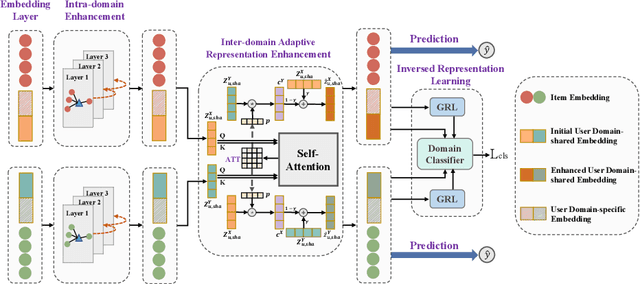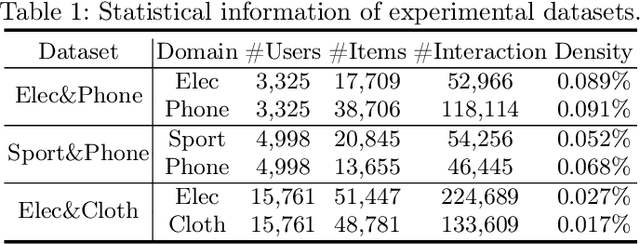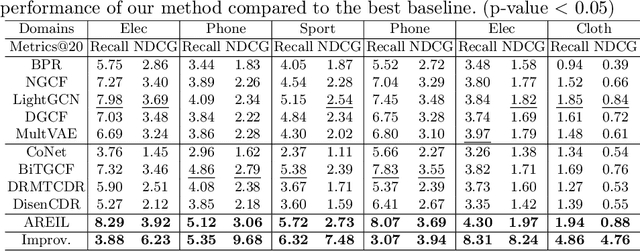Luankang Zhang
Killing Two Birds with One Stone: Unifying Retrieval and Ranking with a Single Generative Recommendation Model
Apr 23, 2025Abstract:In recommendation systems, the traditional multi-stage paradigm, which includes retrieval and ranking, often suffers from information loss between stages and diminishes performance. Recent advances in generative models, inspired by natural language processing, suggest the potential for unifying these stages to mitigate such loss. This paper presents the Unified Generative Recommendation Framework (UniGRF), a novel approach that integrates retrieval and ranking into a single generative model. By treating both stages as sequence generation tasks, UniGRF enables sufficient information sharing without additional computational costs, while remaining model-agnostic. To enhance inter-stage collaboration, UniGRF introduces a ranking-driven enhancer module that leverages the precision of the ranking stage to refine retrieval processes, creating an enhancement loop. Besides, a gradient-guided adaptive weighter is incorporated to dynamically balance the optimization of retrieval and ranking, ensuring synchronized performance improvements. Extensive experiments demonstrate that UniGRF significantly outperforms existing models on benchmark datasets, confirming its effectiveness in facilitating information transfer. Ablation studies and further experiments reveal that UniGRF not only promotes efficient collaboration between stages but also achieves synchronized optimization. UniGRF provides an effective, scalable, and compatible framework for generative recommendation systems.
Generative Large Recommendation Models: Emerging Trends in LLMs for Recommendation
Feb 19, 2025Abstract:In the era of information overload, recommendation systems play a pivotal role in filtering data and delivering personalized content. Recent advancements in feature interaction and user behavior modeling have significantly enhanced the recall and ranking processes of these systems. With the rise of large language models (LLMs), new opportunities have emerged to further improve recommendation systems. This tutorial explores two primary approaches for integrating LLMs: LLMs-enhanced recommendations, which leverage the reasoning capabilities of general LLMs, and generative large recommendation models, which focus on scaling and sophistication. While the former has been extensively covered in existing literature, the latter remains underexplored. This tutorial aims to fill this gap by providing a comprehensive overview of generative large recommendation models, including their recent advancements, challenges, and potential research directions. Key topics include data quality, scaling laws, user behavior mining, and efficiency in training and inference. By engaging with this tutorial, participants will gain insights into the latest developments and future opportunities in the field, aiding both academic research and practical applications. The timely nature of this exploration supports the rapid evolution of recommendation systems, offering valuable guidance for researchers and practitioners alike.
Scaling New Frontiers: Insights into Large Recommendation Models
Dec 01, 2024



Abstract:Recommendation systems are essential for filtering data and retrieving relevant information across various applications. Recent advancements have seen these systems incorporate increasingly large embedding tables, scaling up to tens of terabytes for industrial use. However, the expansion of network parameters in traditional recommendation models has plateaued at tens of millions, limiting further benefits from increased embedding parameters. Inspired by the success of large language models (LLMs), a new approach has emerged that scales network parameters using innovative structures, enabling continued performance improvements. A significant development in this area is Meta's generative recommendation model HSTU, which illustrates the scaling laws of recommendation systems by expanding parameters to thousands of billions. This new paradigm has achieved substantial performance gains in online experiments. In this paper, we aim to enhance the understanding of scaling laws by conducting comprehensive evaluations of large recommendation models. Firstly, we investigate the scaling laws across different backbone architectures of the large recommendation models. Secondly, we conduct comprehensive ablation studies to explore the origins of these scaling laws. We then further assess the performance of HSTU, as the representative of large recommendation models, on complex user behavior modeling tasks to evaluate its applicability. Notably, we also analyze its effectiveness in ranking tasks for the first time. Finally, we offer insights into future directions for large recommendation models. Supplementary materials for our research are available on GitHub at https://github.com/USTC-StarTeam/Large-Recommendation-Models.
Multi-granularity Interest Retrieval and Refinement Network for Long-Term User Behavior Modeling in CTR Prediction
Nov 22, 2024



Abstract:Click-through Rate (CTR) prediction is crucial for online personalization platforms. Recent advancements have shown that modeling rich user behaviors can significantly improve the performance of CTR prediction. Current long-term user behavior modeling algorithms predominantly follow two cascading stages. The first stage retrieves subsequence related to the target item from the long-term behavior sequence, while the second stage models the relationship between the subsequence and the target item. Despite significant progress, these methods have two critical flaws. First, the retrieval query typically includes only target item information, limiting the ability to capture the user's diverse interests. Second, relational information, such as sequential and interactive information within the subsequence, is frequently overlooked. Therefore, it requires to be further mined to more accurately model user interests. To this end, we propose Multi-granularity Interest Retrieval and Refinement Network (MIRRN). Specifically, we first construct queries based on behaviors observed at different time scales to obtain subsequences, each capturing users' interest at various granularities. We then introduce an noval multi-head Fourier transformer to efficiently learn sequential and interactive information within the subsequences, leading to more accurate modeling of user interests. Finally, we employ multi-head target attention to adaptively assess the impact of these multi-granularity interests on the target item. Extensive experiments have demonstrated that MIRRN significantly outperforms state-of-the-art baselines. Furthermore, an A/B test shows that MIRRN increases the average number of listening songs by 1.32% and the average time of listening songs by 0.55% on a popular music streaming app. The implementation code is publicly available at https://github.com/psycho-demon/MIRRN.
Breaking Determinism: Fuzzy Modeling of Sequential Recommendation Using Discrete State Space Diffusion Model
Oct 31, 2024



Abstract:Sequential recommendation (SR) aims to predict items that users may be interested in based on their historical behavior sequences. We revisit SR from a novel information-theoretic perspective and find that conventional sequential modeling methods fail to adequately capture the randomness and unpredictability of user behavior. Inspired by fuzzy information processing theory, this paper introduces the DDSR model, which uses fuzzy sets of interaction sequences to overcome the limitations and better capture the evolution of users' real interests. Formally based on diffusion transition processes in discrete state spaces, which is unlike common diffusion models such as DDPM that operate in continuous domains. It is better suited for discrete data, using structured transitions instead of arbitrary noise introduction to avoid information loss. Additionally, to address the inefficiency of matrix transformations due to the vast discrete space, we use semantic labels derived from quantization or RQ-VAE to replace item IDs, enhancing efficiency and improving cold start issues. Testing on three public benchmark datasets shows that DDSR outperforms existing state-of-the-art methods in various settings, demonstrating its potential and effectiveness in handling SR tasks.
A Unified Framework for Adaptive Representation Enhancement and Inversed Learning in Cross-Domain Recommendation
Mar 30, 2024



Abstract:Cross-domain recommendation (CDR), aiming to extract and transfer knowledge across domains, has attracted wide attention for its efficacy in addressing data sparsity and cold-start problems. Despite significant advances in representation disentanglement to capture diverse user preferences, existing methods usually neglect representation enhancement and lack rigorous decoupling constraints, thereby limiting the transfer of relevant information. To this end, we propose a Unified Framework for Adaptive Representation Enhancement and Inversed Learning in Cross-Domain Recommendation (AREIL). Specifically, we first divide user embeddings into domain-shared and domain-specific components to disentangle mixed user preferences. Then, we incorporate intra-domain and inter-domain information to adaptively enhance the ability of user representations. In particular, we propose a graph convolution module to capture high-order information, and a self-attention module to reveal inter-domain correlations and accomplish adaptive fusion. Next, we adopt domain classifiers and gradient reversal layers to achieve inversed representation learning in a unified framework. Finally, we employ a cross-entropy loss for measuring recommendation performance and jointly optimize the entire framework via multi-task learning. Extensive experiments on multiple datasets validate the substantial improvement in the recommendation performance of AREIL. Moreover, ablation studies and representation visualizations further illustrate the effectiveness of adaptive enhancement and inversed learning in CDR.
 Add to Chrome
Add to Chrome Add to Firefox
Add to Firefox Add to Edge
Add to Edge